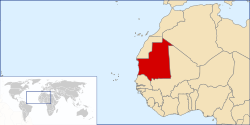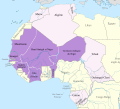Portal:Mauritania
The Mauritania Portal - بوابة موريتانيا
Mauritania, officially the Islamic Republic of Mauritania, is a sovereign country in Northwest Africa. It is bordered by the Atlantic Ocean to the west, Western Sahara to the north and northwest, Algeria to the northeast, Mali to the east and southeast, and Senegal to the southwest. By land area Mauritania is the 11th-largest country in Africa and 28th-largest in the world; 90% of its territory is in the Sahara. Most of its population of some 4.3 million lives in the temperate south of the country; roughly a third of the population is concentrated in the capital and largest city, Nouakchott, on the Atlantic coast. The country's name derives from Mauretania, the Latin name for a region in the ancient Maghreb. It extended from central present-day Algeria to the Atlantic. Berbers occupied what is now Mauritania by the beginning of the third century AD. Groups of Arab tribes migrated to this area in the late seventh century, bringing with them Islam, Arab culture, and the Arabic language. In the early 20th century, Mauritania was colonized by France as part of French West Africa. It achieved independence in 1960. However, the country has since experienced recurrent coups and periods of military dictatorship. The 2008 Mauritanian coup d'état was led by General Mohamed Ould Abdel Aziz, who won subsequent presidential elections in 2009 and 2014. He was succeeded by General Mohamed Ould Ghazouani following the 2019 elections, head of an autocratic government with a very poor human rights record, particularly because of its perpetuation of slavery; the 2018 Global Slavery Index estimates there are about 90,000 slaves in the country (or 2.1% of the population). Despite an abundance of natural resources, Mauritania remains poor; its economy is based primarily on agriculture and fishing. Mauritania is culturally and politically part of the Arab world. It is a member of the Arab League and Arabic is the official language. The official religion is Islam, and almost all inhabitants are Sunni Muslims. Despite its prevailing Arab identity, Mauritanian society is multiethnic. The Bidhan, or so-called "white moors", make up 30% of the population, while the Haratin, or so-called "black moors", comprise 40%. Both groups reflect a fusion of Arab-Berber ethnicity, language, and culture. The remaining 30% of the population comprises various sub-Saharan ethnic groups. (Full article...) Selected article -Amar Godomat (né. Ama Kodu Juuf in Serer, also known as Xamakodu Fa Maak (meaning Hamacodou The Elder, in Serer), or Amar Gôdômat, Ama Kodu Joof in Gambian English, or Ama Codou Diouf in Senegalese French)) is the name given in oral tradition to an 11th-century Serer archer. Serer oral tradition relays that, a Serer bowman named Amar Godomat killed the 11th century Almoravid leader Abu Bakr ibn Umar in battle, with his bow near lake Rzik (just north of the Senegal) (Godomat's name apparently originates with this death). The battle is reported to have taken place near Khoo Maak in Serer country, commonly known as Lake Cayor. One source discussing this oral tradition says that "almoravid Abu Bakar Ben Umar was killed by the arrow of serer warrior Amar Godomat, in the month of shaa'ban 480 (November 1087). This regicide potentially signals his exodus after taking the name "Amar god o maat", "Amar (which) killed (the) king"." Mauritanian oral tradition claims Abu Bakr was killed in a clash with the "Gangara" (Soninke Wangara) of the Tagant Region of southern Mauritania, relating that he was struck down by an arrow from an old, blind Gangara chieftain in the pass of Khma (between the Tagant and Assab mountains, en route to Ghana). Another source for Abu Bakr's death says "In the region of Tagant on his way to Djabal al-Dbahab, the Mountain of Gold, he was wounded, according to the chronicles, by a poisoned arrow, shot by an old black bowman who could not see unless his eye-lids were raised up to uncover his eyeballs. The black bowman asked his daughter to hold open his eyes so that he could aim his arrow. It struck the Amir in the knee. Abu Bakr turned his horse around and rode off..." dying when he arrived in Tagant. (Full article...) This is a Good article, an article that meets a core set of high editorial standards.
Mauritania competed at the 2008 Summer Olympics which was held in Beijing, China. The country's participation at Beijing marked its seventh appearance in the Summer Olympics since its debut in the 1984 Summer Olympics. The delegation included two track and field athletes, Souleymane Ould Chebal and Bounkou Camara, who were both selected by wildcards after both failed to meet either the "A" or "B" qualifying standards. Chebal was selected as the flag bearer for the opening ceremony. Neither of the Mauritanians progressed beyond the heats. (Full article...) CategoriesGeneral images -The following are images from various Mauritania-related articles on Wikipedia.
Related portalsWikiProjects
Topics in MauritaniaCities and towns
CommunesAssociated WikimediaThe following Wikimedia Foundation sister projects provide more on this subject:
Discover Wikipedia using portals | ||||||||||||||||||||||||||||||||||||||||||||||||||||||||||||||||||||||||||||||||||||||||||||||||||||||||








































